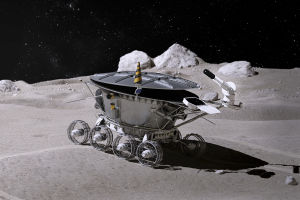
Hey, space-lover Lykkers! Exploring new frontiers in space is often filled with both challenges and triumphs.
Despite facing unexpected difficulties, the Athena lunar mission has provided valuable lessons for future lunar explorations.
The Athena Mission and Its Setback
On March 6, 2025, the private lander developed by Intuitive Machines successfully touched down on the Moon's south pole. However, shortly after landing, the vehicle tilted onto its side, rendering the entire mission inoperative. Despite this, the mission had an unexpected glimmer of success in the form of the MAPP (Mobile Autonomous Prospecting Platform) rover, carried on board by the lander.
Surviving the Harsh Lunar Conditions
The MAPP rover, developed by the American company Lunar Outpost, remained operational after the landing incident. Initially, it was intended to be deployed to explore the lunar surface and perform scientific tasks. Unfortunately, due to the tilt of the lander, MAPP was unable to fully deploy.
Despite this setback, the rover demonstrated its capabilities during the journey to the Moon, during its time in lunar orbit, and on the surface before the lander’s tilt disrupted the mission.
According to Lunar Outpost, MAPP was ready to carry out its mission if given the chance. The rover had successfully collected data from the Moon’s surface and had been prepared to move across the surface to complete its objectives.
The Rover's Mission Goals
The MAPP rover was equipped with several scientific instruments for its mission. Among its primary objectives were testing a Nokia LTE/4G communication system designed specifically for use on the Moon and collecting a small sample of lunar regolith.
The regolith was intended for symbolic sale to NASA for a mere dollar. This was not only a scientific goal but also a symbolic move to establish a legal precedent for the use of space resources.
Though the lander's tilt prevented the rover from achieving these objectives, the data gathered by MAPP during its journey and on the lunar surface has provided valuable insights. These data will be useful for future lunar missions and the development of technology for subsequent space exploration.
The Challenges and Short Duration of the Athena Mission
Unfortunately, the Athena mission had a short lifespan due to the lander's unfavorable orientation, which prevented the solar panels from generating power. However, before the mission ended prematurely, the vehicle was able to transmit some images from the lunar surface, showcasing its ability to capture visuals despite the challenges. After just one day, the lack of power cut the mission short.
Despite the early end to the mission, Lunar Outpost remains optimistic about future missions. The success of the rover’s data collection, along with the system validation provided by the mission, offers hope for future lunar explorations.
Looking Toward the Future
Lunar Outpost has already set its sights on the future. The company is planning to explore other regions of the Moon, including the Reiner Gamma region, with their Lunar Voyage 2 mission. Future missions, such as Lunar Voyage 3, will involve a return to the Moon’s south pole, and Lunar Voyage 4 will focus on deploying the first Australian rover on the Moon.
Lunar Outpost has proven that its systems are capable of surviving the harsh environment of space. The company is eager to showcase its mobility systems and technology in upcoming missions.
What’s Next for Intuitive Machines?
Intuitive Machines is also moving forward with its next mission. Scheduled for launch by the end of 2025, this mission will carry Lunar Outpost’s Lunar Voyage 2 rover. In addition, Lunar Outpost is participating in a NASA bidding process to build an unpressurized rover for a test mission ahead of NASA’s Artemis 5 mission, scheduled for 2030.
Both companies are committed to advancing space exploration and are hopeful that their next ventures will provide new insights and further contributions to humanity’s understanding of the Moon and beyond.
Conclusion
While the Athena lunar mission may not have gone according to plan, it has opened new doors for future lunar exploration. Despite the setback, valuable data was collected, proving that the systems and technologies developed by Lunar Outpost are ready for more ambitious missions.
As space agencies and private companies continue to collaborate, the knowledge gained from these missions will pave the way for future successes, expanding humanity’s reach in space. The Moon holds many mysteries, and with each mission, new hope arises for the exploration of this celestial body.
Intuitive Machines: Athena lunar landing mission over
Video: KHOU 11


